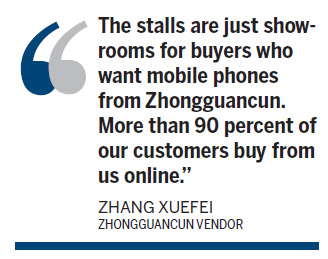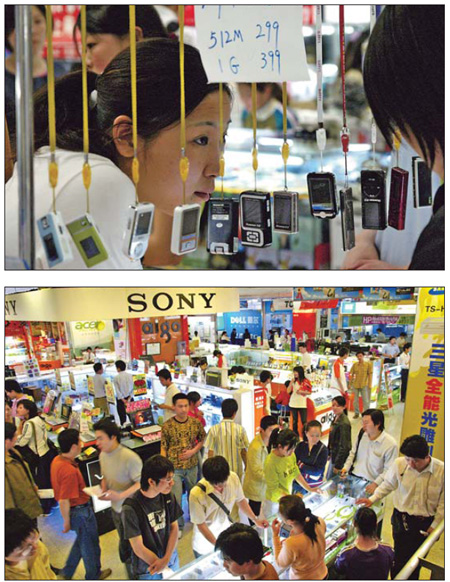Center
From counter space into cyberspace
Updated: 2011-09-28 07:54
(China Daily)

|
From top: Zhongguancun Square, a landmark opened to the public in 2009. Haggling is customary at most stores. Zhongguancun is Beijing's major electronic markets. [Photos Provided to China Daily] |
 |
Many Zhongguancun vendors say the government's move to push out peddlers will only increase their online sales. Zhang Yue, Wang Kaihao, Xu Lin and Erik Nilsson report.
Zhang Xuefei isn't worried the government of Beijing's Haidian district will purge the stall he has run for eight years in Zhongguancun's electronics market. His business doesn't rely on it. The 24-year-old, like many of the hawkers, has been making more money from online sales. So the government policy - intended to replace the unregulated market with big brand sellers and expand the 90-hectare area's high-grade technology park - means the physical stores will likely virtually disappear, only to reappear virtually. The government plan to clear the vendors was approved in 2009 and amended this May to remove at least 50 percent of the wild gray market's peddlers by yearend. Zhang is already swapping counter space for cyberspace.
Zhang Yue, Wang Kaihao, Xu Lin and Erik Nilsson
His real business, he says, isn't his second-floor stall but rather the 16th-floor office of his online store. Dozens of other cubicles surround his.
"The stalls are just showrooms for buyers who want mobile phones from Zhongguancun," Zhang says.
"More than 90 percent of our customers buy from us online."
In turn, more than 90 percent of Zhang's income comes from online sales on Taobao.com, China's version of eBay, and Zol.com, a website offering Zhongguancun products.
Zhang spends more than 200,000 yuan ($31,279) a month to market his online stores - more than 20 times his office's rent.
"Advertising is expensive but effective," Zhang says.
E-stores enable flashy product displays, descriptions and price comparisons.
Shoppers can also leave comments for future buyers' reference.
"That's how we build reputation," Zhang says.
While e-business might be the solution to the government's clearing of Zhongguancun's stallholders, it has been subtracting from their business for years.
Online shopping behemoths, such as Amazon.com and 360buy.com - the country's most popular electronics online retailer, founded by a former Zhongguancun hawker - have long been luring customers from the market's buzzing hive of counters with the nectar of lower prices and greater accountability.
"The question I get most is, 'Are your BlackBerrys real?'" seller Zhang Zheng says.
"But customers can return a phone within a week if they're dissatisfied and don't even need to give a reason if the phone is re-sellable."
360buy.com's sales volume surpassed 10 billion yuan ($1.56 billion) in January and is expected to generate up to 26 billion yuan in 2011, China E-business Research Center reported in August. Its business-to-consumer market share was 18.1 percent in the first half of the year, second to Taobao Mall's 48.5 percent.
And electronics retail leviathans, such as Gome and Suning, are also taking their business - and price wars - online.
They enjoy a sharp competitive edge over such traditional retail platforms as Zhongguancun's, where a lack of regulation creates gray markets full of overcharging, swindling and fake goods.
Software developer Qi Xiaokai says he never imagined a tech whiz like himself could fall prey to conniving hucksters.
But the 31-year-old was duped in September 2010 when he was offered a laptop at less than the market value and was told to wait for 20 minutes.
"The girl seemed so innocent, so I felt OK to hand over my cash," he recalls.
"But I realized it was a scam when I was told to wait for another 30 minutes, and she recommended another model for a higher price."
Two muscular goons arrived to intimidate him, he says. "But I wasn't scared, because I know how Zhongguancun works. To complain or fight only makes it worse. So I bluffed and said I wasn't so easily bullied."
Such bait-and-switch cheats are business as usual at the market.
"I've stopped going to Zhongguancun so often and usually buy electronics online from sites like 360buy.com," he says.
"The quality is good, delivery is fast and after-sales service is great. I still pick up cheap gadgets, like headphones and mice, in the market, because it's near my work."
Qi believes relocating the vendors won't solve the problem of cheating.
"The most cunning liars are from the big stores," he says.
Zhou Wei is among the tech junkies going online for gizmo shopping.
"There are many promotional activities, such as discounts and group buying," the 25-year-old IT worker says.
"I was a diehard Zhongguancun fan. But it's too easy to get cheated there."
(China Daily 09/28/2011 page18)
E-paper

Pearl paradise
Dreams of a 'crazy' man turned out to be a real pearler for city
Literary beacon
Venice of china
Up to the mark
Specials

Power of profit
Western companies can learn from management practices of firms in emerging economies

Foreign-friendly skies
About a year ago, 48-year-old Roy Weinberg gave up his job with US Airways, moved to Shanghai and became a captain for China's Spring Airlines.

Plows, tough guys and real men
在这个时代,怎样才"够男人"? On the character "Man"

